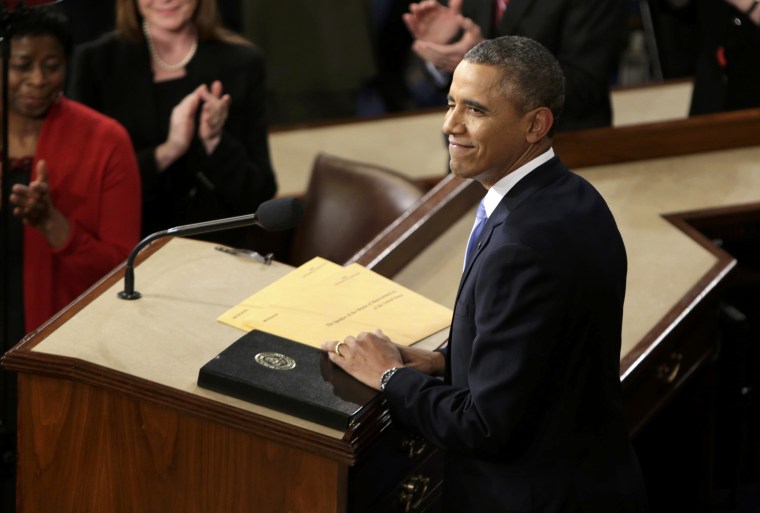
Going into last night, the political scuttlebutt set the stage for a rather contentious confrontation. A lame-duck president, fed up with a do-nothing Congress, would decry Republican obstructionism, blame them for their recent fiascos, and tell the nation how he intended to circumvent the legislative branch that seems incapable of routine governance.
But that's not even close to what happened.
Very early on in the president's address, Obama addressed one of the political crises that rocked Washington just last year:
"For several years now, this town has been consumed by a rancorous argument over the proper size of the federal government. It's an important debate -- one that dates back to our very founding. But when that debate prevents us from carrying out even the most basic functions of our democracy -- when our differences shut down government or threaten the full faith and credit of the United States -- then we are not doing right by the American people."
What struck me as amazing about this paragraph was the sense of collective responsibility -- Obama referenced "us" and "we" when talking about the crises Republicans needlessly imposed on the nation. The president could have assessed blame, and would have been correct to hold Republicans responsible, but Obama was going to extraordinary lengths to be even-handed and conciliatory.
Almost 16 years ago to the day, then-President Clinton delivered a State of the Union address on the heels of the first Republican shutdown and used the opportunity to give GOP lawmakers a stern lecture: "Never, ever shut the federal government down again." Obama did largely the opposite, suggesting all of Washington must do better. No finger-pointing, no assigning blame.
It was a gracious, magnanimous gesture, which only served to remind us of Obama's unyielding, almost exasperating optimism for what's still politically possible.
Remember, as a candidate, Obama ran as a politician who was tired of stale partisan fights and wanted to move past ugly divisions. Republicans, as is now obvious, had other ideas -- the last five years have seen obstructionism and political extortion unlike anything in modern American history.
But even now, the president seems preternaturally resistant to cynicism. For about 70 minutes, Obama stood on the chamber floor and presented an energetic, optimistic "opportunity agenda" as if Congress were still capable of legislating.
To be sure, the president sketched out a vision of unilateral action in several areas. "America does not stand still -- and neither will I," he said. "So wherever and whenever I can take steps without legislation to expand opportunity for more American families, that's what I'm going to do."
But it was more of an offer than a threat. The president presented his ideas in a bipartisan way, urging Congress to meet him halfway.
The speech was more an outstretched hand than a shaking fist. Whether congressional Republicans do what they've been doing and slap it away remains to be seen. Obama seems to believe progress is still possible, even if he's the only one.